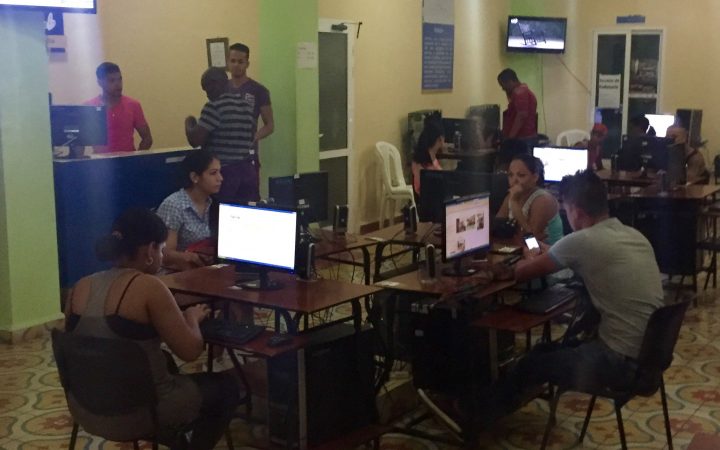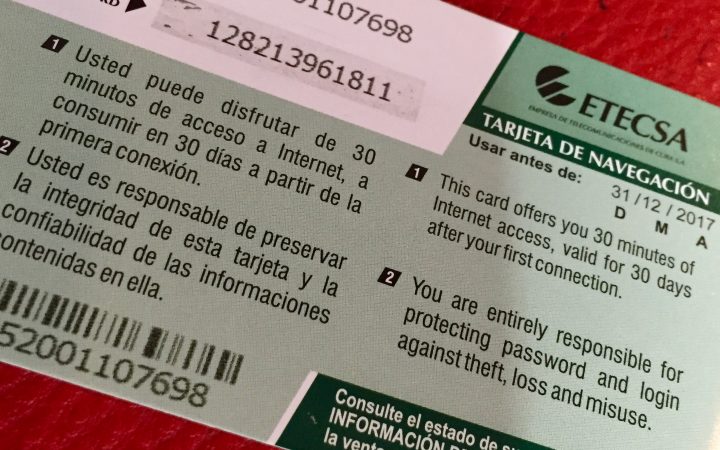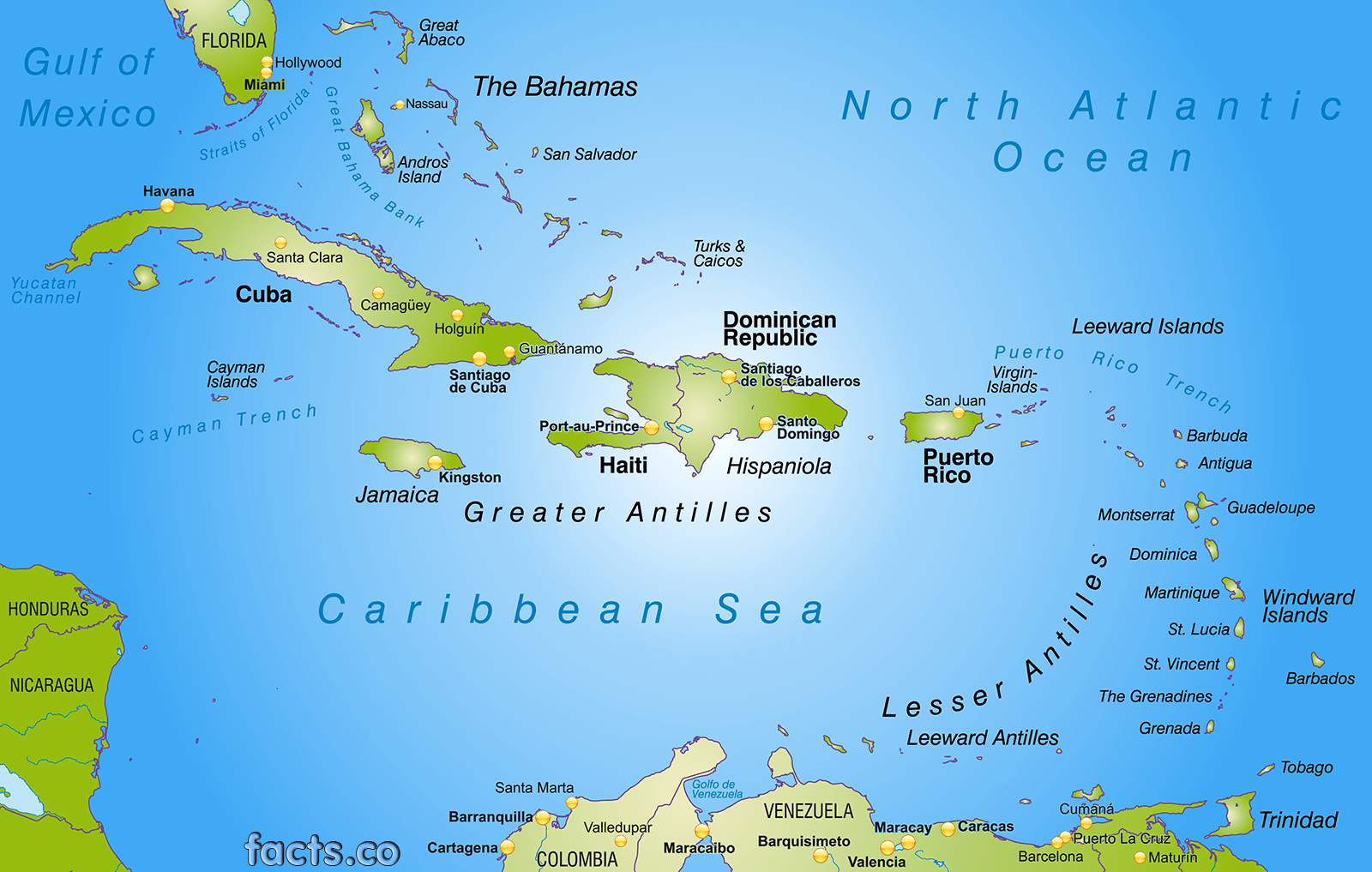Economic backwardnessand technological lagging resulting from the economic system operating in force 60 years could be noticed on this Caribbean island. However, the slowly progressing thaw and first reforms open the door for Cuba to digitization. The country will have to face many challenges such as power supply interruptions or obsolete electric power networks, built in different technologies and often in a manner contrary to the security principles.

Cuban internet cafe.
Cuba is a country that has chosen socialism and manually controlled economy. According to its theoretical assumptions, every citizen should have the same purchasing power fixed centrally. Currently, the average monthly salary of a Cuban citizen does not exceed EUR 30,00.
The Cubans have already started using Internet cafes, where they can sit in front of a computer and read their e-mails or surf different websites. However, the quality of services is significantly reduced and the Internet access very expensive, limited and controlled. WIFI access is available only in special places, usually central spots in the city, paid per hour. To gain Internet access, it is required to buy a card of the national ICT operator with a login and user’s password. There are still lines formed before the opening of the stores where such cards are sold, and the places, where WIFI is available, are easy to spot thanks to large groups of people gathered in one place, sitting on curbs, flower beds, streets and other places, surfing the Internet on their smartpones or sometimes laptops.

WIFI access is available only in special places, usually central spots in the city
Can the significant economic backwardness be an advantage during the slowly progressing digital revolution? Probably, Cuba will be such an example in the world, when we will be able to see how the lack of burden caused by old systems, obsolete technologies and IT infrastructure affects the development and application of technology. The Cubans will not have to grapple with applications written in the rogramming languages, which are nowadays basically unknown and whose maintenance is very costly. Thanks to the fact that the computerization of their country commenced at the time when the world has already undergone several stages of digital revolution, the Cubans will be able to avoid many traps and blind alleys by investing perforce into reliable and up-to-date technologies. The process has already started – I was surprised when I saw in the hot spot one of the latest Chinese routers currently available on the market.
The economic embargo continues to hinder the country’s development, thus, there are already many solutions degined on the basis of the solutions written by Cuban IT specialists. The IT systems are built from scratch, yet still without using public solutions, modules and technologies. One of the largest banks in Cuba use highly modified database widely available under open source licenses to manage its core business. Safe? Probably not so, but it works. The Cubans have an extraordinary capacity to face weather adversities.

Card of the national ICT operator with a login and user’s password
One of the fastest growing business models in Cuba is mail order through commercial bulletins. Even though its range is small, as it is available only to some citizens, it grows dynamically. Assuming that the period of political thaw will support small enterprises, in my mind’s eye I see evolution of this business model to e-commerce. Certainly, it will not happen earlier than in a few years’ time, but the Cubans’ love for mail order and growing Internet access via smartphones bodes well for this segment. Obviously, apart from enforcing the relevant regulations, it will also require supporting bank systems, settlements and distribution, but I believe in the entrepreneurship of Cubans, and the the first harbingers of digitization may already be seen.



Related articles:
– The lasting marriage of technology and human nature
– Top 5 technology events of 2016
– End of the world we know, welcome to the digital reality
– What are the bitcoins? All you need to know
– Big Data: New player in sport
– Chernobyl – the bomb is still ticking
– Modern technologies, old fears: will robots take our jobs?
– Sagrada Familia and the Internet of Things










Jacek B2
Very good read. Clearly, in the coming years it will unseat aliens in their role as the prime source of viewer terror. Very nice pictures
Norbert Biedrzycki
Thank you very much
johnbuzz3
Interesting. I should go there when this still exists 🙂
Norbert Biedrzycki
Worth to go and see – interesting destination. Highly recommended 🙂
Ireneusz Pacula
Very interested article, leading to thinking about big step which Polish IT has made in last 25 years….
Big question mark will be “capacity” of investment wallet, which will decide to invest on Cuba. From a politic side, still there can be a lot of factors which will block tendency to investment in this country. I afraid that without international investments (not only in IT space), Cuba will not be able to make such significant step in short time perspective.
Norbert Biedrzycki
Ireneusz, thank you for your comment. It’s like Poland 25 years ago. Indeed without external help not much would happen. And I’m not referring to only international investments. Everything start with people mind-set for a change. I’m afraid it’s still way to go.